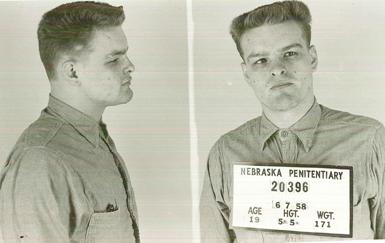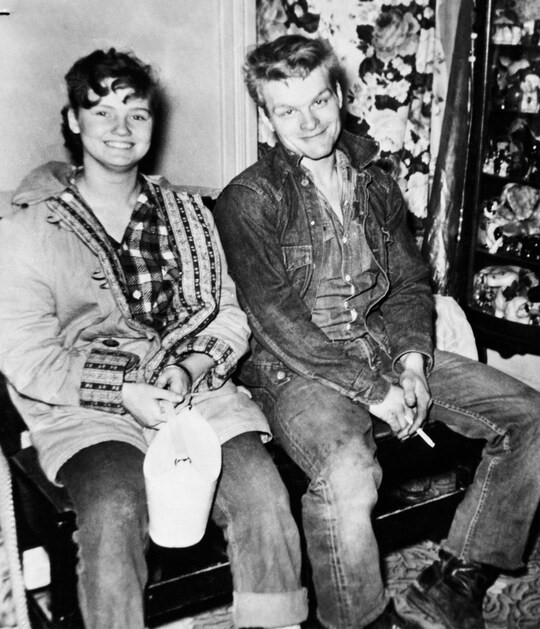-------oOo------
Continuing a look at the events and people in Billy Joel’s We Didn’t Start the Fire.
Each two lines represent a year.
Little Rock, Pasternak, Mickey Mantle, Kerouac
Sputnik, Chou En-Lai, "Bridge on the River Kwai"
Lebanon, Charles de Gaulle, California baseball
Starkweather homicide, children of thalidomide
Buddy Holly, "Ben Hur", space monkey, Mafia
Hula hoops, Castro, Edsel is a no-go
U-2, Syngman Rhee, payola and Kennedy
Chubby Checker, "Psycho", Belgians in the Congo
-----------oOo---------
1959
Starkweather homicide:
Charles Raymond Starkweather (1938 – 1959) was an American spree killer who murdered eleven people in Nebraska and Wyoming between December 1957 and January 1958, when he was nineteen years old. He killed ten of his victims between January 21 and January 29, 1958, the date of his arrest. During his spree in 1958, Starkweather was accompanied by his fourteen-year-old girlfriend, Caril Ann Fugate.
Mugshots of Starkweather in 1958
Caril Fugate, pictured in February 1958
1958 photo released by police, Charles Starkweather and Caril Ann Fugate shown when the teenagers were wanted for questioning in a killing rampage.
Charles Starkweather:
Charles Starkweather was born the third of seven children in 1938 in Lincoln, Nebraska. His father, Guy, was a carpenter who had arthritis in his hands and was often unemployed. His mother, Helen, worked as a waitress. Though the family was poor, it managed. In school, Charles was often bullied because he had bowed legs and a slight speech impediment. He was also very near-sighted, not even able to read the top letter on an eye chart, but it wasn't discovered until he was a teenager; before that, he had been thought of as a slow learner. During gym class, his physique became better, and he started exacting revenge on those who had bullied him and also became a bully himself. After watching Rebel Without a Cause, he became obsessed with actor James Dean, who had the lead role, and started dressing like his character and imitating him. At the age of 16, Charles dropped out of high school.
Relationship with Caril Ann Fugate:
Starkweather was introduced to his girlfriend (and later partner-in-crime), Caril Ann Fugate, through the girlfriend of his best friend. Caril was 13 at the time and he was 18.
Fugate lived in Lincoln, Nebraska, with her mother and stepfather.
Though he was five years older than her, they were madly in love with each other. He took a job at a Western Union newspaper warehouse as a truck unloader; he chose that location because it was close to Caril's junior high school. At some point, Caril crashed his car, a 1949 Ford, while he was teaching her how to drive. Guy Starkweather, who was the legal owner of the car, paid for the damages and threw Charles out of the household, no longer willing to put up with his behavior. Charles then quit his job at the warehouse and became a garbage collector, using his route to plan bank robberies (though he never actually carried them out).
Killing Spree, Capture, and Conviction
In 1957, aged 19, Starkweather committed his first murder. On November 30, he went to a gas station and tried to buy a stuffed dog toy for Fugate. When he found that he wasn't carrying enough money, the manager, Robert Colvert, refused to let him buy it on credit and threw him out. At 3:00 a.m. the next day, he returned with a shotgun. First, he entered the store twice and bought first a package of cigarettes and then a package of chewing gum. The third time, he came in dressed with a bandanna and a hat to cover his face and held him at gunpoint with the shotgun. After forcing him to open the store's safe and robbing it, he forced Colvert outside to his own car, made him drive to a nearby remote area and shot and killed him. Later that day, he told Caril about the robbery, though he left out the part when he killed Colvert.
Starkweather later lost his job as a garbage collector and was evicted from where he lived because he couldn't pay his rent.
On January 21, 1958, he went to Fugate's family's home with a rifle and ammunition. The details of what happened that day are sketchy, but the outcome of his visit was that Fugate's stepfather, Marion Bartlett, and mother, Velda Bartlett, were both shot to death with the rifle he brought and their baby daughter, Betty Jean, was fatally stabbed and strangled. After putting up a sign on the house's door saying the whole household was sick with the flu, they spent a few days living in the house with the bodies of Fugate's family still in there.
Police arrived on the 27th after Fugate's grandmother became suspicious and called them, by which time she and Starkweather had already gone to a farm in Bennet, Nebraska and killed the owner, August Meyer, and fled.
They hitched a ride from two teenagers, Robert Jensen, and Carol King, and killed them after forcing them to drive them to a nearby abandoned storm shelter. The next day, by which time they had already left the area, the duo's old car, which had gotten stuck in the mud, was found along with the bodies of Meyer and the teenagers.
Starkweather and Fugate then fled to a wealthier part of Lincoln with Jensen's car and attacked the home of a wealthy industrialist named C. Lauer Ward. Only his wife, Clara Ward, and their maid, Lillian Fencl, were home at the time. After killing Ward and one of the household's two dogs, they forced Fencl to make them breakfast. When Mr. Ward himself came home that afternoon, he was shot to death. Fencl was then tied to a bed and killed as well. They then left in the Wards' Packard. When the bodies were found, a full-scale manhunt began and the police started a house-by-house search of the area, even calling in the National Guard. The FBI was also brought in. The mayor of Lincoln offered a reward of $1,000.
When Starkweather and Fugate realized that the Packard they were driving would attract attention, they approached a Buick owned by Merle Collison, a traveling salesman, near the highway close to Douglas, Wyoming, shot him to death, stole the vehicle and drove away.
Because the car had a parking brake, which Starkweather wasn't accustomed to, the car wouldn't move when he started it. A bypasser offered to help, only to be threatened by Starkweather with a knife. A nearby deputy sheriff, William Romer, noticed the exchange and called for backup, setting off a pursuit. Fugate got out of the car, crying and saying that Starkweather had killed someone, while Starkweather ran back to the Packard and started driving towards Douglas. Police picked up the chase and fired at the car, which stopped in the middle of the road; a bullet had shattered a windshield, cutting Starkweather near the ear enough to make him bleed. Thinking he had been mortally wounded, he pulled over and surrendered so he could get medical attention. Both he and Fugate were then arrested and tried in Nebraska.
Starkweather after capture
Fugate after capture
At first, Starkweather stated that he had forced Fugate to come with him, but then started changing his story repeatedly, finally asserting that she had been a willing accomplice who had actually committed some of the murders.
Fugate maintained that she had been held hostage, though she wasn't believed. Starkweather was only tried and found guilty of the murder of Robert Jensen and sentenced to death. Because there was evidence suggesting that Fugate had had opportunities to leave Starkweather that she hadn't taken, she received a life sentence as his accomplice.
At noon of June 25, 1959, Starkweather was executed by electric chair.
Fugate’s later life:
In 1973, the Nebraska Board of Pardons commuted Fugate's sentence to 30–50 years, making her eligible for parole. Governor J. James Exon and Secretary of State Allen Beermann voted in favor of the commutation, while Attorney General Clarence A. H. Meyer dissented.
Fugate's life sentence was commuted and she spent 17 years at the Nebraska Correctional Center for Women in York, Nebraska before being released early for good behavior.
A retired medical aide, she was last known to live in Hillside, Michigan. In 2007, she married a man named Fredrick Clair. They were in a car accident together in 2013 when their SUV went off the road. Fugate survived with serious injuries, but Clair died.
Fugate, going by her married name of Caril Ann Clair, was denied a pardon by the Nebraska Board of Pardons in February 2020. Her pardon application was supported by relatives of the murder victims. She maintained her innocence in the 1958 slayings, and requested a pardon to "alleviate the burden" of being known as a convicted killer. Her pardon was denied because the role of a pardon is to restore a felon's rights and because her request was too broad for the parole board.
Gallery:
Starkweather pictured in a Converse County jail cell
Caril Ann Fugate waits for medical treatment for her shock at the Converse County Sheriff's Office on Jan. 29, 1958.
Fred and Caril Clair in an undated photograph
____________________










No comments:
Post a Comment
Note: Only a member of this blog may post a comment.